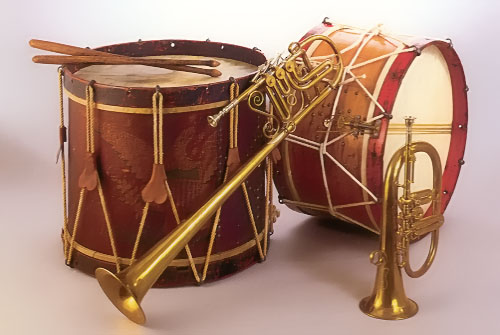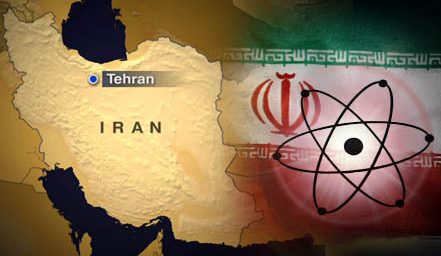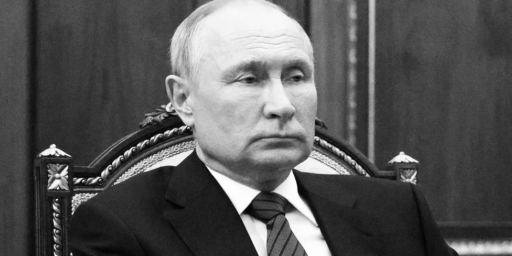Now That’s a Drumbeat
 In the years following the invasion of Iraq I frequently read claims that there had been a long “drumbeat to war” in advance of the invasion. When I asked those making such claims to substantiate them, I was invariably disappointed. I can only interpret this op-ed from Alan J. Kuperman, director of the Nuclear Proliferation Prevention Program at the University of Texas at Austin, as a drumbeat to war:
In the years following the invasion of Iraq I frequently read claims that there had been a long “drumbeat to war” in advance of the invasion. When I asked those making such claims to substantiate them, I was invariably disappointed. I can only interpret this op-ed from Alan J. Kuperman, director of the Nuclear Proliferation Prevention Program at the University of Texas at Austin, as a drumbeat to war:
Since peaceful carrots and sticks cannot work, and an invasion would be foolhardy, the United States faces a stark choice: military air strikes against Iran’s nuclear facilities or acquiescence to Iran’s acquisition of nuclear weapons.
The risks of acquiescence are obvious. Iran supplies Islamist terrorist groups in violation of international embargoes. Even President Ahmadinejad’s domestic opponents support this weapons traffic. If Iran acquired a nuclear arsenal, the risks would simply be too great that it could become a neighborhood bully or provide terrorists with the ultimate weapon, an atomic bomb.
As for knocking out its nuclear plants, admittedly, aerial bombing might not work. Some Iranian facilities are buried too deeply to destroy from the air. There may also be sites that American intelligence is unaware of. And military action could backfire in various ways, including by undermining Iran’s political opposition, accelerating the bomb program or provoking retaliation against American forces and allies in the region.
But history suggests that military strikes could work. Israel’s 1981 attack on the nearly finished Osirak reactor prevented Iraq’s rapid acquisition of a plutonium-based nuclear weapon and compelled it to pursue a more gradual, uranium-based bomb program. A decade later, the Persian Gulf war uncovered and enabled the destruction of that uranium initiative, which finally deterred Saddam Hussein from further pursuit of nuclear weapons (a fact that eluded American intelligence until after the 2003 invasion). Analogously, Iran’s atomic sites might need to be bombed more than once to persuade Tehran to abandon its pursuit of nuclear weapons.
As for the risk of military strikes undermining Iran’s opposition, history suggests that the effect would be temporary. For example, NATO’s 1999 air campaign against Yugoslavia briefly bolstered support for President Slobodan Milosevic, but a democratic opposition ousted him the next year.
He concludes:
We have reached the point where air strikes are the only plausible option with any prospect of preventing Iran’s acquisition of nuclear weapons. Postponing military action merely provides Iran a window to expand, disperse and harden its nuclear facilities against attack. The sooner the United States takes action, the better.
That’s completely unambiguous. He’s urging us to go to war with Iran.
I think that Dr. Kuperman is too quick to dismiss Iran’s likely responses to such an attack and too optimistic about its prospects for success. We should keep in mind that attacking Iran would be yet another “war of choice” for us but the present Iranian regime would be fighting for its survival. We should expect it to respond commensurately.
Contrary to the title of Dr. Kuperman’s op-ed, I no longer believe there is any way to “stop Iran” and we should be devoting our energies to evaluating how to contain it and moving to do so. Unfortunately, I don’t believe we have the stomach either to stop or to contain Iran.





Dave, if you read this long timeline you’ll see things like:
(2:40 p.m.) September 11, 2001: Rumsfeld Is Told Al-Qaeda Was Behind 9/11 Attacks But Wants to Blame Iraq
and
September 15, 2001: Wolfowitz Suggests Striking Iraq Immediately; Bush Decides to Focus on Afghanistan First
Good threads and reminders of how the drumbeat went.
I would change stomach to ability. The only effective way wold be to occupy Iran. With troops in Iraq and Afghanistan and our economy in trouble, no way. On top of that, if they really are “mad mullahs” as Bolton constantly suggests, they could cripple oil shipments for a while.
Steve
Will Israel attack Iran’s facilities and defenses?
If yes, then we will become involved, either up front, or just after as Iran retaliates on both Israeli and American targets.
If no, then the US has the option to attack first, or to try some sort of nebulous containment policy that probably has a zero chance of success.
Will we attack (before or with Israel)?
If yes, we are following the Doctor’s line in the post.
If no, containment by some magic or another may well be tried. Just how we could stop the Iranians from donating a bomb (once they have some) or two to their favorite terrorist organization is not clear. At some point, any sanctions we impose will become so provocative that the Iranians deciding to ship a bomb or two out would become very much more likely. We lose a city or two, sooner or later. If the later, perhaps the more bombs shipped, and the more cities we lose. This doesn’t lead to good things.
Do we then decide to attack after all, and if so, how far will it go?
A simple bombing of nuclear facilities is not on without first eliminating the air defenses Iran has, both in fighter aircraft, AA missile systems and their command and control capabilities. Then a relatively long campaign could be launched from the air using the huge bunker buster bombs we have developed carried by our bombers. One effect of this air campaign is that there would be very significant civilian casualties, because many of the locations of importance are deliberately surrounded by cities full of people.
A further consideration is the question of how well we can target their facilities, and hence, what is the probability of success given the enormous effort cited above? Would 50% be adequate? That doesn’t seem very satisfactory, since we cannot be reasonably certain of stopping bomb development and their eventual use—on us! Another losing idea. eventually.
What is left to do? As I see it, we either accept the inevitable loss of two or more cities downstream without being certain of the source (which means it would be an educated guess as to the source, and a resulting obliteration of much of Iran’s major cities on that guess.), or, we could invade, preferably before they do have bombs to throw at our troop and ship concentrations.
As I have suggested before, we needn’t necessarily have to run all the way to Tehran. By occupying the Western and Southern areas, we could accomplish several things: we capture most of their oil fields; we prevent the attacks on Strait vessels; and we just might draw out the Iranian army into a pitched battle, which we could win handily, I believe. The fourth thing just might well be surrender by the Iranian government (or their Guard component). At the least, this offers us a probable win, not a loss, with hopefully less civilian casualties.
Gee, all it takes is the will, a year or two, and some more of that printed money….
Of course, it just might be prudent to try to take out their long-range missile systems too, and any naval vessels that could threaten the Straits on order to minimize their responses. The target list grows and grows…
Guess all that blood is not a factor to your average conservative keyboard warrior…
Seems some people don’t use a balanced approach to this issue. Which route through this maize costs the fewer lives and blood?
1) Do nothing and almost certainly lose cities full of our people, and Israeli people too, sooner or later. Sanctions, you see, will not work at all. The Iranians will not give up their nuclear weapons program, and our retaliation would cost the lives of cities full of Iranians;
2)Wait till the attempts at sanctions peter out hoping for a miracle; which will arrive in the form of mushroom clouds over NY, DC, SF and others.
3) Do something to prevent that loss to us and our friends, while minimizing the losses of the Iranians at the same time, and avoiding a nuclear exchange.
Those are the choices. What idiot would select #1 or #2? angin-san would!